The Great Pot Plane Crash Of 1979
"Everyone fighting the fire had a high old time...." 
On June 6, 1979. An old Douglas DC-6 cargo plane carrying 12 tons of
marijuana plummeted over a hillside at Kanawha Airport. Hundreds of
bales of marijuana spewed from the plane before it caught fire.
Onlookers looted the marijuana, and law enforcement officials struggled
for days to dispose of it all. Nine people were charged in the pot plane
case, and several of them were convicted after lengthy court battles.
|


Aircraft still burning on side of hill.
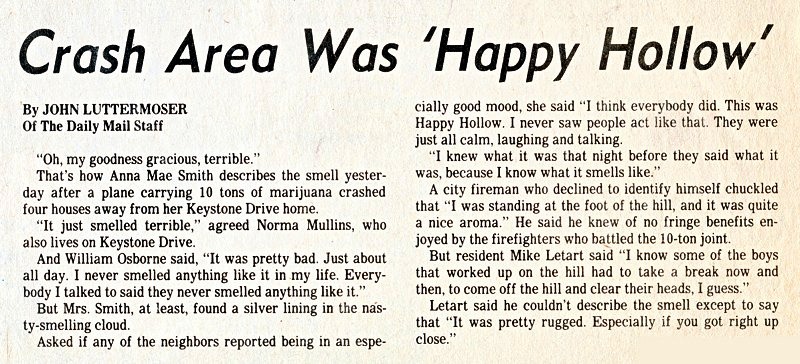
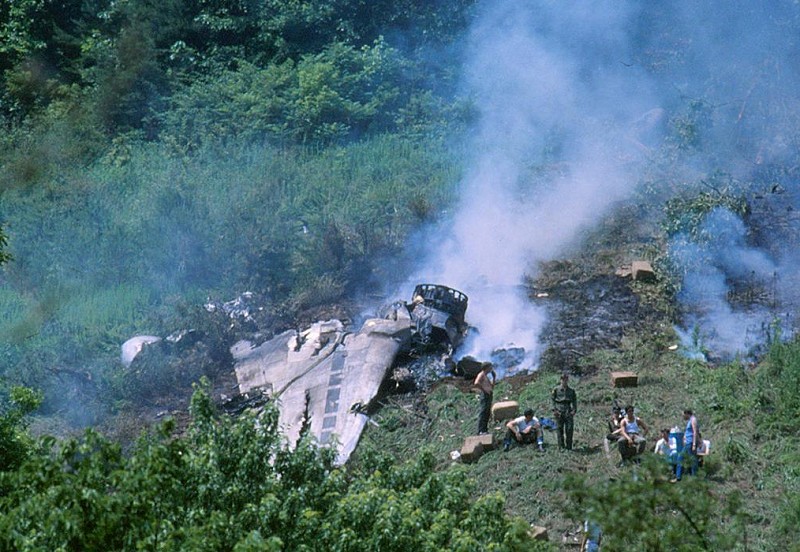
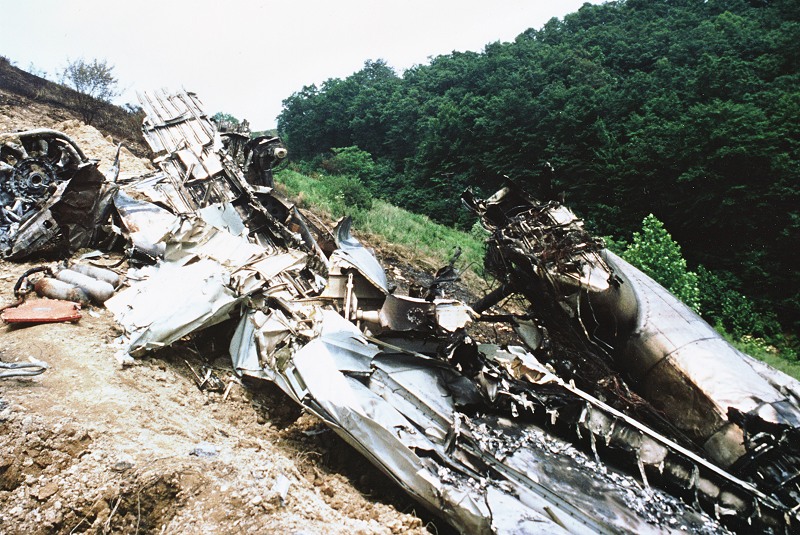
"After bouncing over a draining ditch and down a steep slope, it finally came to rest on it's back
breaking into pieces. At that point the aircraft exploded, which miraculously tossed the crew clear."
|
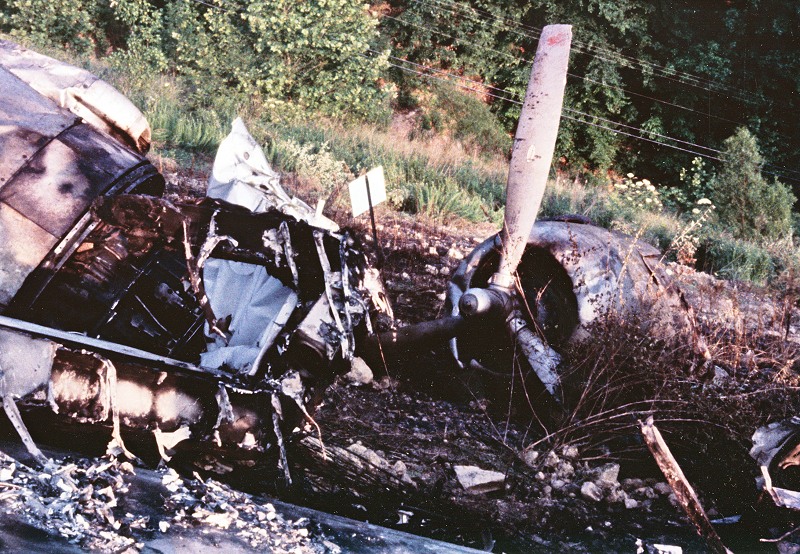
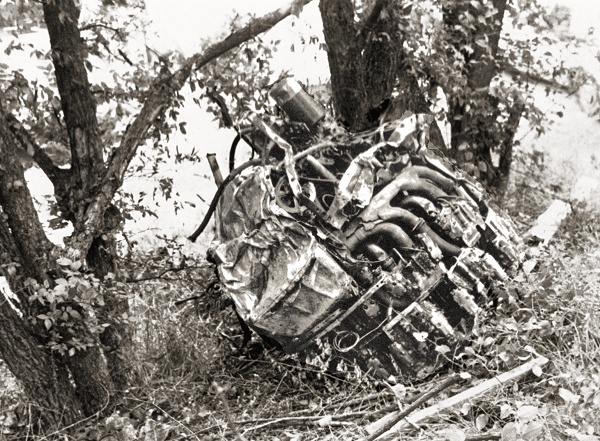
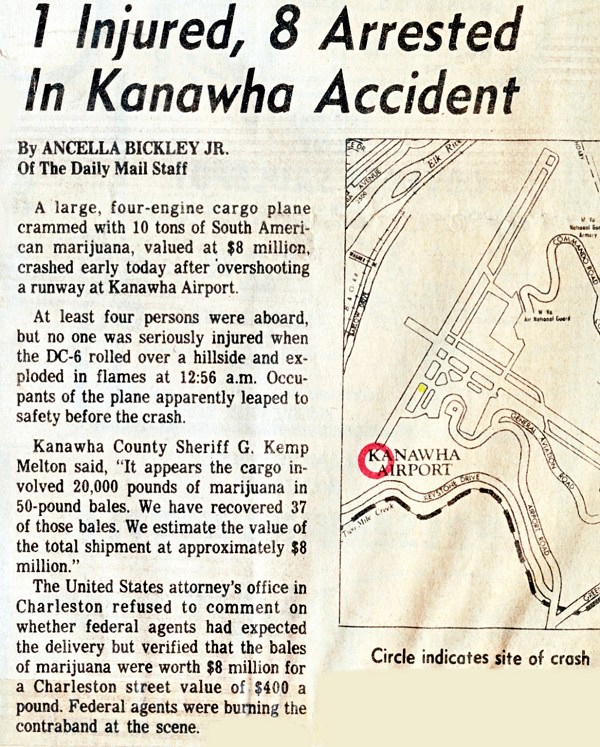
But even if they had landed safely...
|
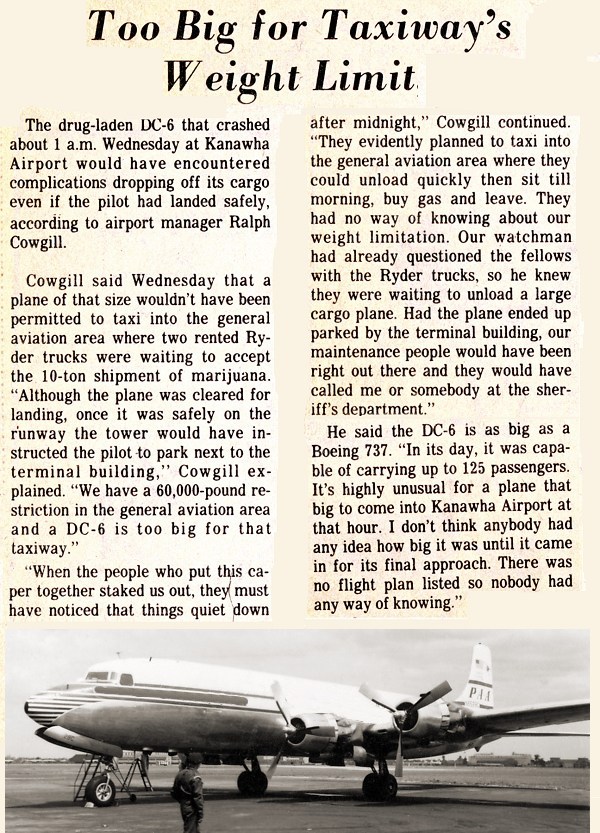
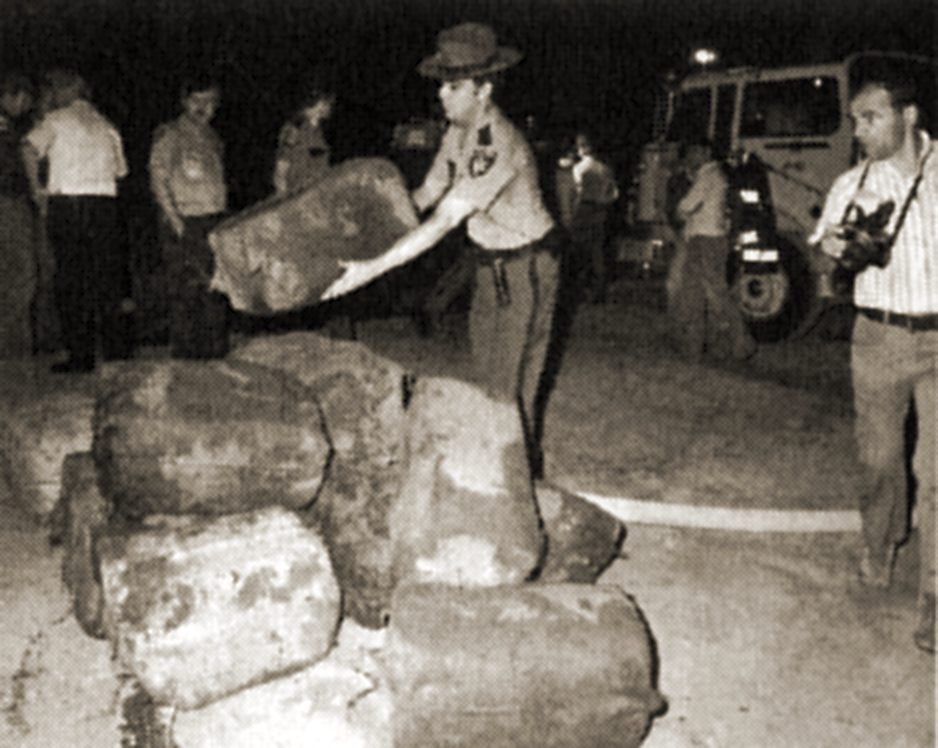
State Police gathering up some of the spilled bales of Pot.
Great Article By James Haught Of the Charleston Gazette ODDBALL news events occur from time to time in West Virginia - and one of the wildest was the historic Pot Plane crash of 1979.
The caper involved a bizarre cast, including some moviemakers who, believe
it or not, eventually got out of jail and won an Academy Award.
The tale began after midnight on a summer night. An old Douglas DC-6 cargo
plane, four propellers whirring, approached Yeager (then Kanawha) Airport
and radioed for permission to land. Tower operators didn't know that the
darkness-shrouded craft contained 12 tons of marijuana.
Inside the plane were three young men in their 20s: The pilot, David
Seesing, a former Eagle Scout, was a Texas aircraft salesman who lived with
the daughter of President Nixon's ambassador to Australia. The co-pilot,
Dana Anderson, had previously served drug terms in Morocco and Colombia,
and had vanished from New York after his name surfaced in the murder of a
top model's lover.
Waiting on the ground in yellow Ryder rental trucks, ready to unload the
cargo, were five others, including Leon Jacques Gast and Shahbaz "Shane"
Zarintash. Gast was a movie producer who called his company Gassed Films.
Zarintash was an Iranian immigrant who had attended West Virginia Tech and
worked as an engineer for the state Division of Highways.
Also nearby, in an unmarked police car, was Kanawha County Sheriff's Deputy
Mark Chadwick. His father, Sgt. Jim Chadwick, was at the county police
headquarters.
Then the plan went haywire. The DC-6 touched down, but gunned its engines
in a doomed attempt to climb. The craft plummeted down a hillside, ripping
apart, spewing 400 or so 50-pound bales of pot, and catching fire. The crew
jumped for their lives. One of the four engines reached Keystone Drive in
the valley far below. Bales hung in treetops and ruptured down the slope.
Police and emergency crews roared to the airport. Officers found Anderson
staggering along a road, injured. Nearby were Seesing and the third
crewman, muddy and bloody. At first, they told police they had been fighting.
Radio alarms were flashed around the Kanawha Valley. Police soon caught the
others in the fleeing Ryder trucks. Later, charges were filed against the
father-and-son deputies, Jim and Mark Chadwick, accusing them of aiding the
smuggling plot.
Sightseers began looting the spilled pot, and 15 were arrested. Police
doused the bales with fuel oil, trying to burn them, and sprayed the
hillside with herbicide. National Guardsmen patrolled the site. Some bales
were buried - then dug up again after looters tried digging. It was a mess.
Trials finally began the following winter. Four suspects pleaded guilty,
including director Gast. He said he and Zarintash were trying to make a
documentary movie about a boxing match by Muhammad Ali in Africa.
Other defendants sweated through months of courtroom delays. It was called
the "snow-to-roses trial" because it stretched into summer.
One defense attorney, Edwin Kagin of Kentucky, lived in a tent at Kanawha
State Forest. Nearby, another defense lawyer, Richard Chosid, stayed in a
camper. Also tenting was an investigator, disbarred lawyer Harry Shelor.
They said they were saving defense costs for clients.
When verdicts finally came down, four more smugglers were convicted, and
all got five-year sentences. Sgt. Chadwick was found innocent, and his
son's trial ended with a hung jury.
More court struggles ensued. Bankrollers of the plot were indicted and
convicted. Some verdicts were set aside, and the smugglers convicted again.
Young Deputy Chadwick finally was acquitted - even though three of the
smugglers testified that he had been their lookout. Then-Sheriff Danny
Jones said Chadwick "walked into my office after the verdict, demanded to
see me, and asked for six years back pay." The ex-deputy filed several
appeals seeking more than $100,000 from taxpayers, but the Gazette and
others protested, and his effort failed.
Meanwhile, lawyers bit the dust. One bankroller who pleaded guilty was
Florida lawyer Frederick Shapiro. Then defense lawyer Chosid was convicted
in a Michigan pot-smuggling scheme. Worst of all, ex-lawyer Harry Shelor,
who had served as an investigator, drew a death sentence for murdering a
state trooper who discovered his Kentucky pot patch.
Another weird twist happened a year after the crash, when lawyer Jon Duncan
came to a Monroe County bank with a garbage bag containing $58,000 in small
bills. The money was deposited in the attorney's escrow account. Later,
$42,600 more was brought in a fishing tackle box. Four other deliveries
raised the total to $157,000.
Federal agents said the money came from the Pot Plane plot. They charged
the bank with failing to obey a law requiring disclosure of cash deposits
greater than $10,000. Then-federal Judge Elizabeth Hallanan remarked that
"$58,000 in small bills in a garbage bag is not routine."
The bank paid a fine. One of the marijuana smugglers and a Monroe County
man he had met in Kanawha County jail - a psychotic who had shot his
girlfriend to death in the Kanawha County welfare office - were convicted
in 1986 for this money mess.
The Pot Plane caper seemed over. Then an epilogue occurred. Director Gast
finally finished his film about Muhammad Ali, titled "When We Were Kings" -
and it won a 1997 Oscar for best documentary.
The lawyer who lived in a tent, Kagin, son of a Presbyterian minister,
today is a leader in national agnostic groups.
In the news business, we watch a lot of strange stories unfold. This one
was a classic.
Haught is the Gazette's editor.
Pubdate: Mon, 13 Oct 2003
Source: Charleston Gazette (WV)
Keith Lake posted the following response in 2009
Harry Shelor Jr. was never a lawyer and thus could not have been
disbarred. He was a convicted felon at 17 years of age for taking a
stolen car across state lines on a joy ride. He was a paralegal in the
employ of Edwin Kagan. He was involved in another 'Pot Case' which
involved a plot of land owned by Edwin Kagan. He did not receive the
dealth penalty verdict as you have reported.
He was given a plea bargain based on circumstance of evidence which
linked him to the crime site. The plea bargain was set for 15 years by a
blind public defender who was assigned the case after the initial
defense attorney failed to prevent a mistrial and hung jury due to a
state representative passing legislation on such crimes having the
ability to secure a seat on the jury as a 'farmer' who really had not
opinion or connected with the case.
The mistrial was overseen by judge Carmel Cook who accepted the plea
bargain in lieu of retrying the case as a death penalty option... the 15
year sentence was interpreted by the parole board as a 50 year serve
out.... with no consequence for Kagan or any of the other investors
associated with the West Virginia and Cornbread Mafia Syndicate from
whence the support came.
Thats justice for you... the record stands corrected
"The Cornbread Mafia"
LOL
|
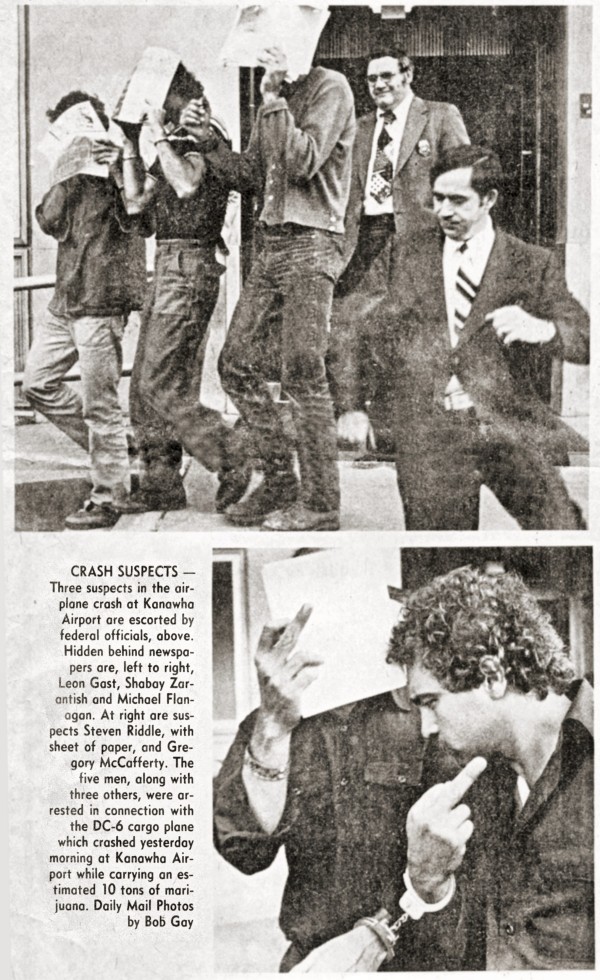
Photos courtesy of Yeager Airport Archives. Articles by The Charleston Gazette and Daily Mail
Finally, from Facebook:
Glennis Walker said:
The story left out the part where all of the seeds from the plants were
scattered all over the mountain and more plants started growing and
they tried to kill the plants with diesel fuel but it didn't work and
soon we .... er I mean the locals soon started smoking Diesel Pot ......
One of the biggest challenges for the authorities was what to do with the pot after the crash.
“With 20,000 pounds of marijuana, it was too much for an evidence room.
The feds came in and decided they would burn it,” “The newspaper
interviewed Anna Marie Smith and she just talked about how there was an
awful smell and it was just burning all the time. And then they asked
her about how things had been on the street. And she just said, ‘Well,
all of a sudden everybody's really calm, and they were laughing and
talking.’ And it said they started calling her road ‘happy holler.’”
There's rumors that seeds from the pot grew up the hillside beside the
airport. Authorities tried to kill the plants with diesel fuel, but
some locals say the plants didn’t die off and some residents foraged
the wild marijuana growing there.
The reason the smugglers were bringing the marijuana into the United
States was another issue. Leon Gast was waiting on the ground in a
rental truck to collect the goods. The story came out later that he was
smuggling the pot to help finance a film about the “Rumble in the
Jungle” fight between Muhammad Ali and George Foreman in Zaire in 1974.
Gast was convicted on drug smuggling charges, but once he got out of
prison, he did actually make the movie, called “When We Were Kings,”
and it won an Academy Award in 1996.
|
|
|
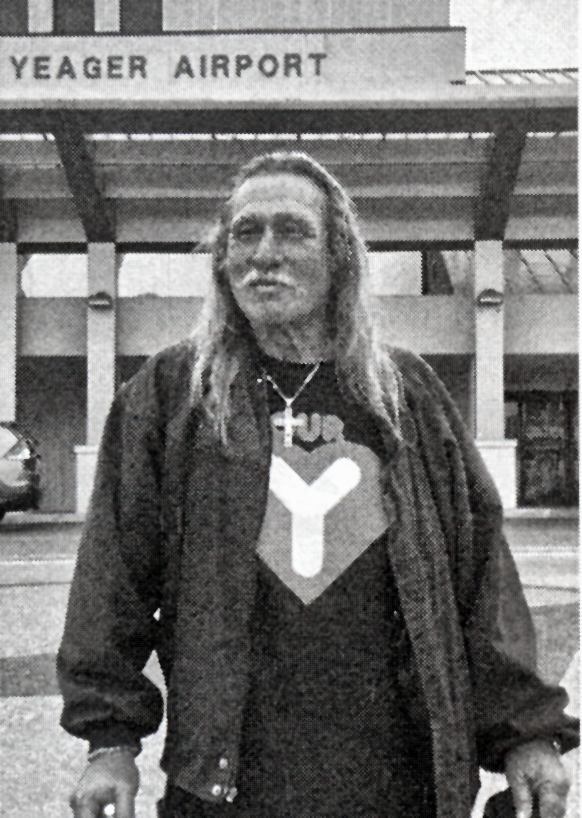 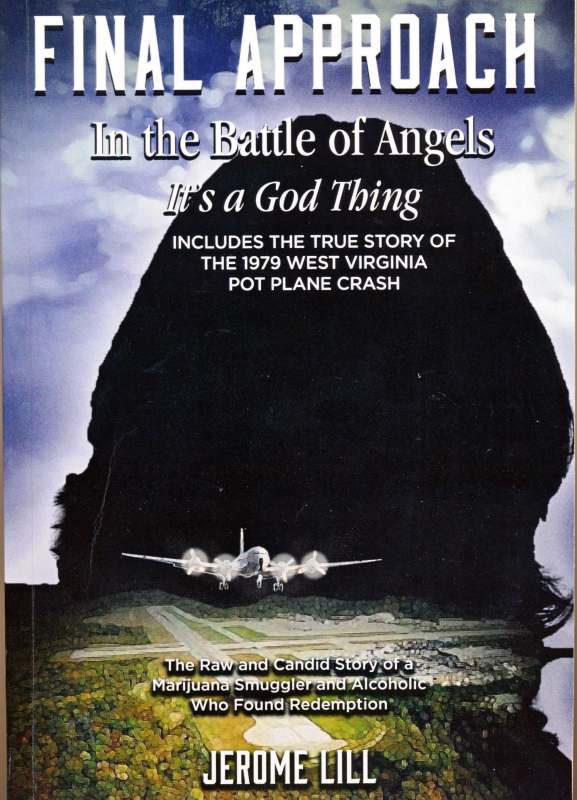
Jerry Lill arrives in Charleston at Yearger Airport in 2021 to relive old times and promote his book.
|
All photos Copyright, and not to be used without permission of Mywvhome.com

Back To Seventies Index
|














